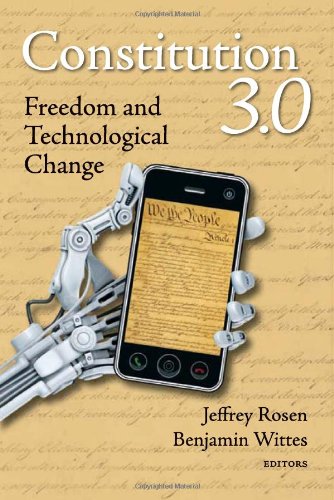

Most ebook files are in PDF format, so you can easily read them using various software such as Foxit Reader or directly on the Google Chrome browser.
Some ebook files are released by publishers in other formats such as .awz, .mobi, .epub, .fb2, etc. You may need to install specific software to read these formats on mobile/PC, such as Calibre.
Please read the tutorial at this link: https://ebookbell.com/faq
We offer FREE conversion to the popular formats you request; however, this may take some time. Therefore, right after payment, please email us, and we will try to provide the service as quickly as possible.
For some exceptional file formats or broken links (if any), please refrain from opening any disputes. Instead, email us first, and we will try to assist within a maximum of 6 hours.
EbookBell Team

5.0
108 reviewsTechnological changes are posing stark challenges to America's core values. Basic constitutional principles find themselves under stress from stunning advances that were unimaginable even a few decades ago, much less during the Founders' era. Policymakers and scholars must begin thinking about how constitutional principles are being tested by technological change and how to ensure that those principles can be preserved without hindering technological progress.
Constitution 3.0, a product of the Brookings Institution's landmark Future of the Constitution program, presents an invaluable roadmap for responding to the challenge of adapting our constitutional values to future technological developments. Renowned legal analysts Jeffrey Rosen and Benjamin Wittes asked a diverse group of leading scholars to imagine plausible technological developments in or near the year 2025 that would stress current constitutional law and to propose possible solutions. Some tackled issues certain to arise in the very near future, while others addressed more speculative or hypothetical questions. Some favor judicial responses to the scenarios they pose; others prefer legislative or regulatory responses.
Here is a sampling of the questions raised and answered in Constitution 3.0:
• How do we ensure our security in the face of the biotechnology revolution and our overwhelming dependence on internationally networked computers?
• How do we protect free speech and privacy in a world in which Google and Facebook have more control than any government or judge?
• How will advances in brain scan technologies affect the constitutional right against self-incrimination?
• Are Fourth Amendment protections against unreasonable search and seizure obsolete in an age of ubiquitous video and unlimited data storage and processing?
• How vigorously should society and the law respect the autonomy of individuals to manipulate their genes and design their own babies?
Individually and collectively, the deeply thoughtful analyses in Constitution 3.0 present an innovative roadmap for adapting our core legal values, in the interest of keeping the Constitution relevant through the 21st century.
Contributors include Jamie Boyle, Erich Cohen, Robert George, Jack Goldsmith, Orin Kerr, Lawrence Lessig, Stephen Morse, John Robertson, Jeffrey Rosen, Christopher Slobogin, O. Carter Snead, Benjamin Wittes, Tim Wu, and Jonathan Zittrain.